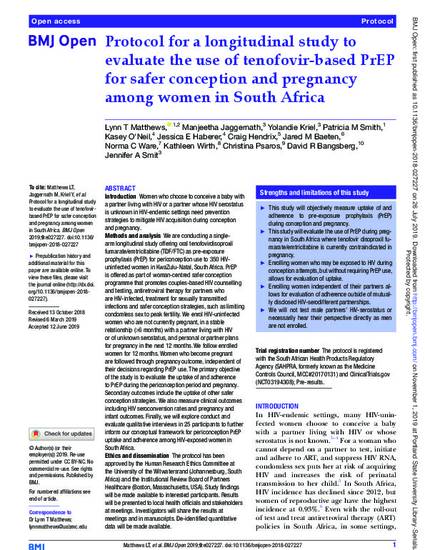
- Disease prevention -- Case studies -- South Africa,
- HIV infections
Introduction Women who choose to conceive a baby with a partner living with HIV or a partner whose HIV serostatus is unknown in HIV-endemic settings need prevention strategies to mitigate HIV acquisition during conception and pregnancy.
Methods and analysis We are conducting a single-arm longitudinal study offering oral tenofovirdisoproxil fumarate/emtricitabine (TDF/FTC) as pre-exposure prophylaxis (PrEP) for periconception use to 350 HIV-uninfected women in KwaZulu-Natal, South Africa. PrEP is offered as part of woman-centred safer conception programme that promotes couples-based HIV counselling and testing, antiretroviral therapy for partners who are HIV-infected, treatment for sexually transmitted infections and safer conception strategies, such as limiting condomless sex to peak fertility. We enrol HIV-uninfected women who are not currently pregnant, in a stable relationship (≥6 months) with a partner living with HIV or of unknown serostatus, and personal or partner plans for pregnancy in the next 12 months. We follow enrolled women for 12 months. Women who become pregnant are followed through pregnancy outcome, independent of their decisions regarding PrEP use. The primary objective of the study is to evaluate the uptake of and adherence to PrEP during the periconception period and pregnancy. Secondary outcomes include the uptake of other safer conception strategies. We also measure clinical outcomes including HIV seroconversion rates and pregnancy and infant outcomes. Finally, we will explore conduct and evaluate qualitative interviews in 25 participants to further inform our conceptual framework for periconception PrEP uptake and adherence among HIV-exposed women in South Africa.
Ethics and dissemination The protocol has been approved by the Human Research Ethics Committee at the University of the Witwatersrand (Johannesburg, South Africa) and the Institutional Review Board of Partners Healthcare (Boston, Massachusetts, USA). Study findings will be made available to interested participants. Results will be presented to local health officials and stakeholders at meetings. Investigators will share the results at meetings and in manuscripts. De-identified quantitative data will be made available.

© Author(s) (or their employer(s)) 2019. Re-use permitted under CC BY-NC. No commercial re-use. See rights and permissions. Published by BMJ.This is an open access article distributed in accordance with the Creative Commons Attribution Non Commercial (CC BY-NC 4.0) license, which permits others to distribute, remix, adapt, build upon this work non-commercially, and license their derivative works on different terms, provided the original work is properly cited, appropriate credit is given, any changes made indicated, and the use is non-commercial. See: http://creativecommons.org/licenses/by-nc/4.0/.